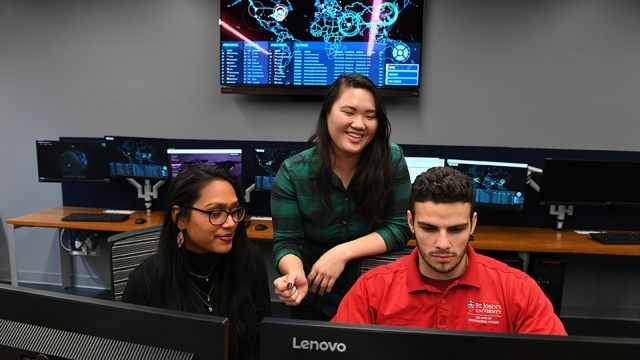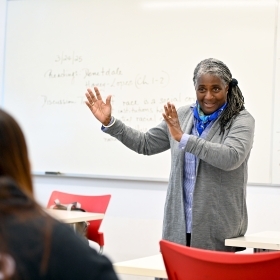Diversity: 5 Ways it Boosts Student Success

When embarking on your higher education journey, it’s crucial to think about what can help you succeed as a student. Choosing a campus that values diversity is one factor that can bring many benefits—not only in college but also in your future career.
This blog explores what diversity looks like on college and university campuses and how its presence boosts student success. These benefits include improving your learning experience, cultivating a sense of belonging, increasing cultural awareness, and helping you become a well-rounded global citizen in today’s diverse workplace.
What is diversity in higher education?
Diversity at a college or university goes beyond having students, faculty, administrators, and staff from different races, genders, or ethnicities. It entails having a community of people with varied experiences, beliefs, values, and perspectives. The following examples fall under the category of diversity:
- Race and ethnicity
- Gender and sexual orientation:
- Age
- Religion and belief systems
- Socioeconomic status
- Physical and mental abilities
- Educational background
- Nationality and geographic origin
- Language
- Cultural practices, customs, and traditions
It is important to note that this list is incomplete, and diversity extends beyond these specific aspects.
How are colleges and universities promoting diversity and inclusion?
Every college and university takes a different approach to promoting diversity and inclusion. Therefore, it is imperative to research each school’s specific efforts before deciding where to attend. Here are some common ways that colleges and universities currently promote diversity and inclusion on their campuses:
- Providing resources and support for underrepresented groups, such as scholarships and mentorship programs.
- Offering student organizations and clubs focused on promoting diversity and inclusion.
- Prioritizing diversity in the admission process and actively recruiting students from various ethnic and cultural backgrounds.
- Educating and training faculty, administrators, and staff on creating inclusive classrooms and workspaces.
- Including an inclusive curriculum that reflects diverse perspectives, experiences, and academic disciplines. Examples may include multicultural studies, gender and sexuality, social justice, and international affairs.
At many colleges and universities, such as St. John’s University, you can experience a blend of diverse and inclusive practices encompassing many of the examples mentioned above.
Related: Explore the St. John's Office of Equity and Inclusion.
Five Ways Diversity Boosts Student Success
1) Diversity enhances the learning experience.
When students with different backgrounds and experiences come together, it brings various perspectives and ideas to the classroom. This leads to a more well-rounded and comprehensive learning experience.
A 2020 article by the American Psychological Association found that an inclusive classroom provides many global academic benefits, including critical thinking opportunities, higher overall achievement levels, and an increased interest in improving people’s lives.
2) Diversity fosters cultural awareness and understanding.
Developing cultural awareness and understanding is a valuable skill that extends far beyond your college years. It equips you with the ability to navigate diverse environments, foster meaningful connections, and thrive in an increasingly interconnected world. By embracing cultural awareness, you can build bridges across differences, promote inclusivity, and contribute to a more harmonious and empathetic global society.
3) Diversity helps you become a global citizen.
You can learn to navigate a globalized world, embrace cultural differences, and gain cross-cultural communication skills through exposure to different cultures and backgrounds.
The Pew Research Center recorded nearly 45 million immigrant residents living in America, making up 13.7 percent of the US population as of 2018. Cross-cultural communication skills have become an integral part of learning more than ever before. Developing these skills in college can be crucial in fostering understanding, resolving conflicts, and building meaningful relationships.
4) Diversity creates a supportive campus environment.
A diverse campus environment is essential for promoting inclusivity and creating a sense of belonging where people from all backgrounds feel valued and respected. Today, many colleges and universities provide support systems for students through various clubs, campus resources, and organizations.
It is also essential for underrepresented students to see people like themselves in leadership positions, faculty, and the student body. This sends a powerful message that their voices and experiences matter. According to a survey, 96 percent of minority students share that having minority professors positively impacts their education.
5) Diversity prepares you for the workforce.
College campuses with diverse student populations help prepare you for the future workplace by developing skills vital for thriving in inclusive and various organizations. Being exposed to different perspectives, backgrounds, and experiences helps foster important qualities like adaptability, empathy, and cultural competence, which are crucial in today’s globalized workforce.
INSIGHT Into Diversity’s article, “Why Cultural Competence Matters to Recruiters,” dives deeper into the subject matter, sharing that “as the workforce continues to become more diverse, people who are accepting of and able to work well with all people—regardless of their race, ethnicity, sexual orientation, and any other number of factors—will appeal more to the majority of employers.”
Begin your journey to choosing a diverse college or university.
St. John’s University is an exemplary institution that embodies the spirit of diversity. With its commitment to fostering a vibrant and multicultural community, St. John’s provides you with a supportive environment to engage with individuals from various backgrounds, broaden your perspective, and develop cultural awareness and understanding.










